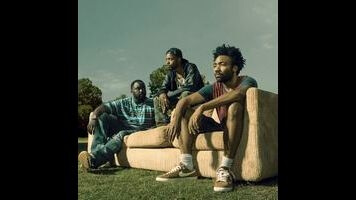Contemporary hip hop culture has been endlessly debated and dissected, but too often through the lens of a “civilization in decline” narrative that misses the point and shortchanges the genre. Critics of hip hop usually target trap music, the spiritual successor to west coast murder rap, pointing to its reliance on corner boy braggadocio and alleged glamorization of drug culture. That reading ignores the complexities and nuances of trap hop, which more than anything is about valorizing entrepreneurial spirit. When Rick Ross talked about how everyday he’s hustlin’, or when the Clipse talked about grindin’, they’re talking about the virtue of hard work, and how they’re applying the same ol’ fashioned work ethic and sticktoitiveness to the rap game that they once brought to the drug game.
That’s the kind of dichotomy constantly on display in Donald Glover’s Atlanta, a show about three black men trying to navigate a world full of frustrating, circuitous paths that not everyone has to take. To be a black man in America is to be constantly reminded that you’re never more than one wrong turn away from being reduced to a petty thug. It’s no accident that Glover’s script starts in medias res, just moments before Earnest Marks’ name will be attached to the very kind of senseless street violence he’s trained himself to avoid. There’s far more to Earn than what could be gleaned from seeing his goofy high school graduation photo in a crime segment on the nightly news. But to many, Earn will never be more than one of those idiotic rap dudes who got into a violent altercation over some minor transgression.
These are heavy ideas for a sitcom, though much of the conversation around Atlanta will be about whether the decidedly somber show deserves that classification. (That’s kind of a boring conversation, but one I’ll still wind up participating in despite my better judgment.) Thankfully there’s something kind of breezy about “The Big Bang,” some kind of magic that buoys a show built to sink. Part of that magic is Glover himself, whose charm is more effortless than it appeared to be when he played Troy Barnes in Community.
It’s impossible not to root for Earn, even as Glover goes out of his way to show how ambivalent most of the people in Earn’s life are toward him. The mother of his daughter canoodles with him in the morning, then casually announces that she has a date in the evening. His parents chide him for his habit of dropping deuces at their house without flushing. And when Earn finally connects with Paper Boi, his cousin is immediately suspicious because of how long it’s been since they’ve seen each other. But hopefully the viewer isn’t supposed to see Earn as a sad sack, because Glover’s innate likeability prevents me from pitying him. Earn just seems like some dude. Not exceptional but totally benign.
Earn is also really good company, which is a refreshing change of pace from drama-comedy hybrids that go to great lengths to make their protagonists unpleasant. The exception to that rule would be Aziz Ansari’s Master Of None, the show to which Atlanta will be most often compared. By the looks of the pilot, Atlanta will exceed the very handsome Master Of None visually thanks to the keen eye of director Hiro Murai, who signed on to direct all 10 episodes of the first season. Murai is one of the most exciting music video directors working today, and it’s impressive seeing how nimbly he had shifted to a show like Atlanta, which has to balance style with substance. He makes some really interesting choices, but he’s also getting out of the show’s way as it figures out what it wants to be.
Judging from “The Big Bang,” Glover wants Atlanta to be a show about a couple of characters navigating their local music scene and making all the wrong moves. But I’m already impressed by the layers on display here, and I’m curious to see how far the show can push its thematic envelope while keeping the episodes as breezy and comfortable as possible. If Glover can make his ideas on art, culture, race, and gender as palatable as the pilot is, I’m excited to see what he can do.
Stray observations
- Welcome to Atlanta reviews. I live in Atlanta and I’ve been all the places on the show. Not really but I could go if I wanted to.
- The moment on the bus with the Nutella guy is dreamy and weird, but interesting. I understand more what Glover meant when he described the show as “Twin Peaks with rappers.”
- Earn on his deuce caper: “Did you try breaking it up with a stick?”
- I must say, as concepts for novelty rap songs go, I’ve heard much worse than “Muckin’.” I mean…massage and fuckin’? That’s just good hospitality.

 Keep scrolling for more great stories.
Keep scrolling for more great stories.
